#s2e2 'the clue'
Explore tagged Tumblr posts
Text
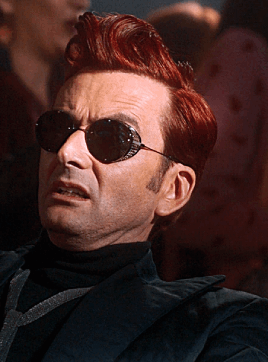
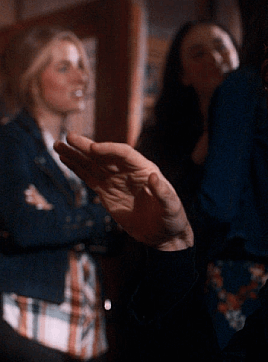
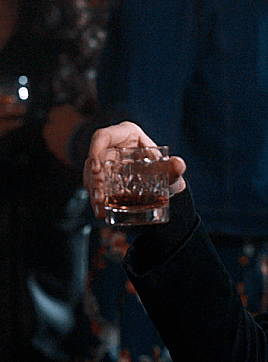
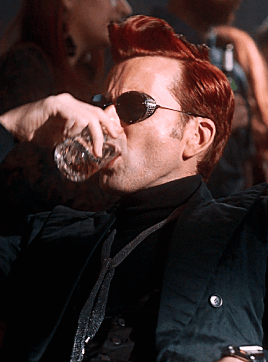
Crowley in the pub | [Aziraphale]
#good omens#good omens 2#good omens 2 spoilers#crowley#the fact that this turtleneck was in only one episode is... supremely unfair#to put it mildly#look i'm as ace as they come#but that doesn't stop me from aesthetically appreciating david tennant wearing things and holding a glass of scotch ok#s2e2 'The Clue'#gifs#i made this
2K notes
·
View notes
Text
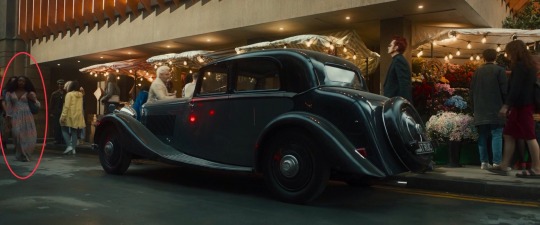
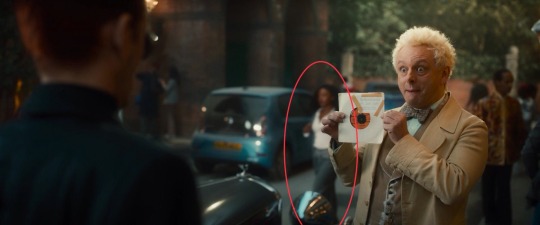
Hm… This legit makes 0 sense. I also don’t believe in the team making mistakes at all, so respectfully does anyone have any ideas on why this extra changed clothes?
More clues for something being afoot… They’re only in 2 shots as far as I can see…
#good omens#good omens meta#good omens analysis#good omens theories#A Clue#go s2e2#s2e2#good omens s2#good omens s2e2
49 notes
·
View notes
Text
WHAT UP GUYS, 11 HOURS TO GO
I'm sorry to do this with so little time left, buuut... I just got struck by a prediction and I wanted to write it down before the whole show comes out.
So:
Below are PROPER plot spoilers from Episodes 1 & 2, INCLUDING the last scene of Episode 2. I consider this A WHOPPER of a spoiler. Seriously, don’t read unless you’ve been to one of the screeners or you eat spoilers for breakfast.
-
Last chance -!
-
-
-
RIGHT.
My theory is that someone has tried to erase Gabriel’s name from the Book of Life, and it went wrong. Rather than erasing him, it erased his memory, or his essential angel-ness.
Our Protagonists are going to realise this, or come partway to realising this, when they discover which book Gabriel has been reading, as of the end of Ep 2. Because... Gabriel isn’t in the Good Omens novel. From the perspective of Show Omens, in Book Omens Gabriel’s entire plotline is removed, and he is even replaced in a key scene towards the end by the Metatron. And we know Derek Jacobi is reprising his role as the Metatron in this series. 👀
#Gabriel#good omens#good omens 2#good omens 2 spoilers#good omens s2e1#good omens s2e2#The Arrival#The Clue
20 notes
·
View notes
Text
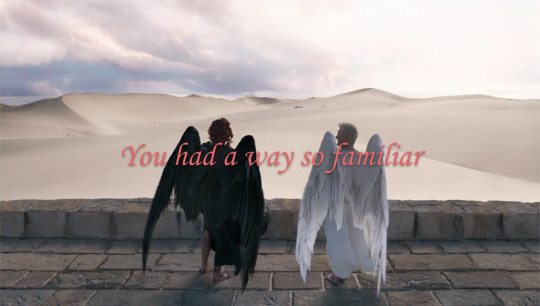
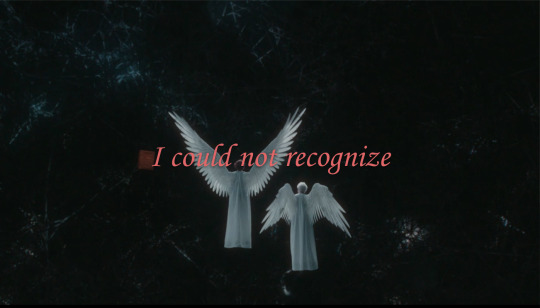
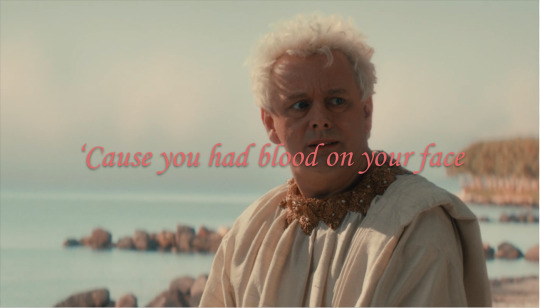

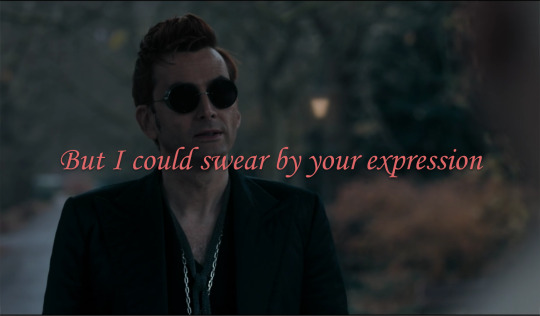

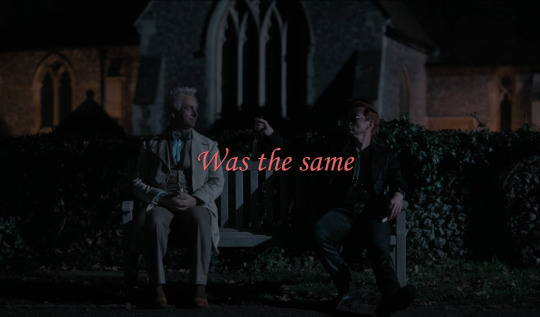

it was a cold, dark evening such a long time ago when by the mighty hand of Jove it was a sad story, how we became lonely two-legged creatures it's the story of the origin of love.
#ok sorry sorry#i know this incredibly shitty it just came to me in a fevered haze and i had to get it out#good omens#hedwig and the angry inch#good omens 2#good omens spoilers#good omens edit#ineffable husbands#neil gaiman#terry pratchett#the origin of love#s1e1: in the beginning#s2e1: the arrival#s2e2: the clue#s1e3: hard times#s1e6: the very last day of the rest of their lives#s2e6: every day#aziraphale#crowley#photoset#i hope to god this is readable
16 notes
·
View notes
Text
I can’t believe my polyamorous aroallo Jim agenda is winning
#no clue what direction it’s gonna go with these relationships but i really like the way jim and olu seem to primarily identify as friends#even though they’re very intimate and have very strong emotions#ofmd s2e2#ofmd s2e3#ofmd s2#ofmd season 2#jim jimenez
7 notes
·
View notes
Text
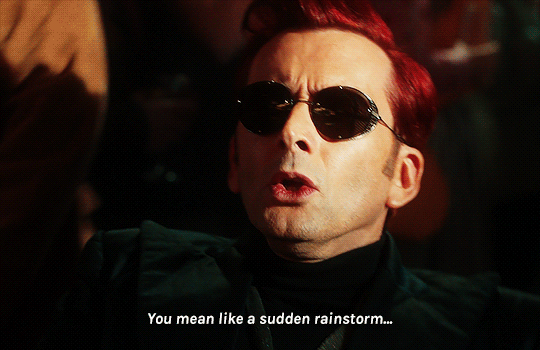
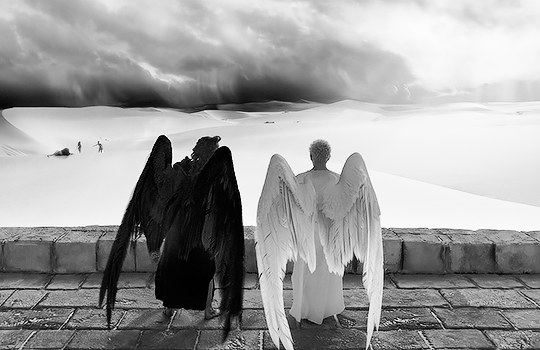
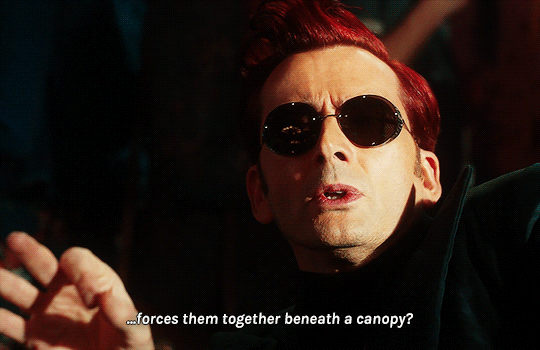


good omens: s2e2 the clue || s1e1 in the beginning
#goodomensedit#good omens#good omens season 2#ineffable husbands#aziracrow#*mine: gifs#good omens spoilers#sorry if anyone's already done this but i haven't seen it and it's been making me absolutely insane#ah good omens gifs i missed you lol
6K notes
·
View notes
Text
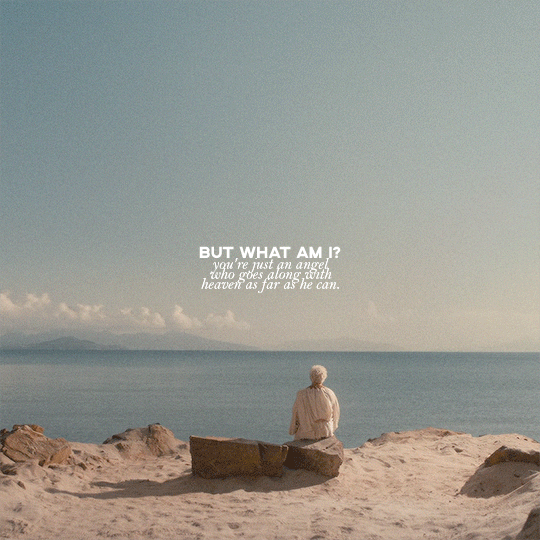
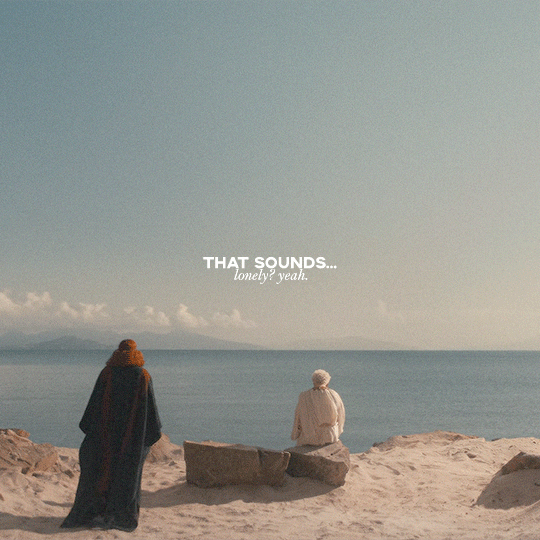
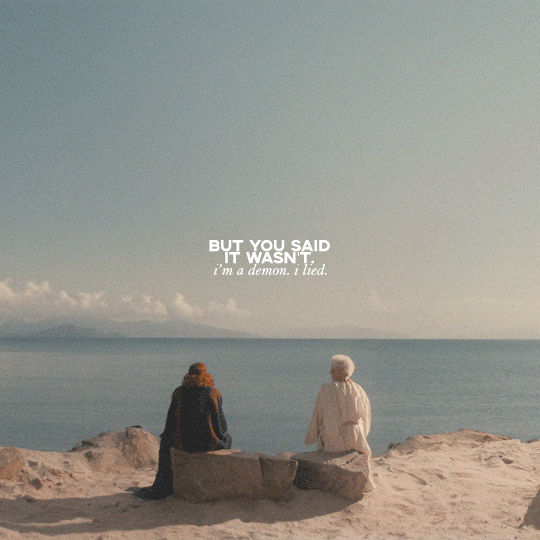
Good Omens S2E2 - The Clue
#good omens#good omens s2#good omens s2e2#ineffable husbands#aziracrow#aziraphale#crowley#good omens edit#good omens gif#tvedit#televisiongifs#tvfilmsource#ineffablehusbandsedit#aziracrowedit#dailygoodomens#userbbelcher#userrobin#goodomenssource#dailyineffablehusbands#michael sheen#david tennant#*#my gifs
710 notes
·
View notes
Text






"But what am I?"
"Chapter 2: The Clue" S2E2 - Good Omens (2019 - )
#good omens#gomens#good omens series#good omens 2#good omens season 2#good omens s2#go#go season 2#go s2#chapter 2: the clue#aziraphale#crowley#aziracrow#michael sheen#david tennant#good omens gifs#gifset#my gifs#tvedit#*sorry its messy click for better quality
212 notes
·
View notes
Text
The most CRAFTED Byler moments were all directed by the core creators
A reminder that the most significant scenes for Bylers, where we've found clues in the actors' performances, the blocking, the deliberate parallels, all the little details -- where the DIRECTOR nailed down things beyond the written page -- are ALL in episodes directed either by Shawn Levy (THE producer who works closest with the Duffers) or the Duffers themselves:
s2e2 - "Crazy together" DUFFER BROTHERS s2e8 - Mike remembering the first time they met DUFFER BROTHERS s2e9 - Mike sad after Will dances with a girl DUFFER BROTHERS s3e3 - Rain fight, how Mike reacts to El vs. Will being upset SHAWN LEVY s3e8 - Will's "not possible," Mike's open-eyed kiss and awkwardness, Hopper's letter while Mike pines for Will DUFFER BROTHERS s4e2 - Awkward airport half-hug, Mike nervously asking about the painting, Rink-O-Mania fight DUFFER BROTHERS s4e3 - Mike deflecting in his fight with El SHAWN LEVY s4e4 - Mike and Will's two intimate heart-to-hearts, Mike nervously asking if they could be "best friends" SHAWN LEVY s4e8 - Will's van confession, Mike's loving reaction, EVERYTHING about how that scene was shot over an entire day DUFFER BROTHERS s4e9 - Mike and El's interrupted conversation about...?, Mike's monologue, El seeing MAX in danger prompting her to free herself from Vecna (which departs from the script!), El's lack of intimacy with Mike post-monologue, Mike and Will's last heart-to-heart, the LAST SCENE DUFFER BROTHERS
We're not delusional, folks. Everything we've caught on to was deliberately placed by the core creators themselves.
Byler's their BABY and our little secret!
-teambyler

255 notes
·
View notes
Text

[TLDR: me attempting to make sense of the Arcane's eldritchness, which sounds ironic in hindsight but hear me out]
Revelation after revelation aside, there are many pieces of foreshadowing that tell us why Viktor's commune wasn't as great as it seemed.

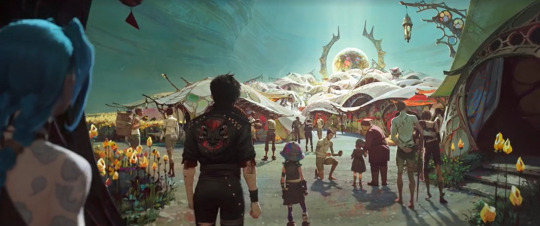

Visually speaking, all the clues are right there.
The first thing we see of the slums of Zaun is this.
Vi, leading their little group, is astonished to find such a thing—and to think that Huck was there, serving as one of its ushers! Huck, who she immediately calls a filthy traitor; having succumbed to shimmer the last time she saw him—meaning he'd turned to Silco both literally and figuratively—what with his use of the drug and the fact that he'd ratted her and Caitlyn out to the tycoon.
Miss Ma'am is bamboozled.
How the hell did he end up there? At this...paradise? At the slums, which, only a few weeks or months ago; was still dark, dusty, violet, and violent!
Something has changed, obviously; and Huck himself admits that his past was him 'at his worst'. Simply awful. But the Herald had saved him. And because of that, he was leading a better life, now. Naturally, at this point, Vi and Jinx seem wary.
There's gotta be a catch, no?

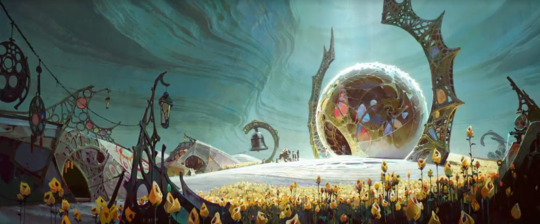
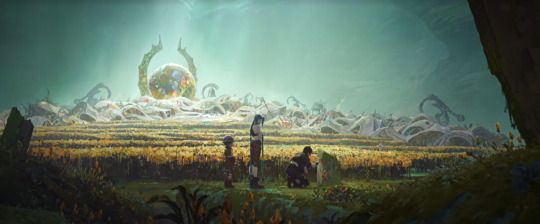

The landscape and the characters exemplify this.
Let's start with the land itself. Look at how empty it actually looks. Yes, there's a field of flowers. Yes, there's a community, teeming with life. Yes, it's literally heaven. But the lighting. The colours. It's so...bleak. Like a dream. The mountains are green, but they're cast in grey and white; and added with the negative space, there's an eeriness to it that contrasts Piltover's version of an eutopia.
You can argue it being the vast resource difference, as Topside is the superior city for a reason, but the commune is still filled with numerous individuals with just as much creativity as their counterparts. Intelligent and sentient beings—people, with minds to set to whatever task may be at hand.
Now, let's think of the people.
The biggest difference between the two communities is this: the 'healed' of Viktor's paradise wear only one mode of dress: white. It's almost uniform—which is notable, as, previously in the episode, Viktor speaks of 'chaos'. We see how fascinated he was by the mess that Vander's psyche had become, and in an attempt at detangling that chaos, he was 'setting things right' inside the man's mind. Bringing him back to something resembling normalcy. Order.
This is particularly significant for the fact that, in the game, he's remembered for his philosophy on glorious evolution (also mentioned in the show, as we know)—which is centred on the enhancement of the human body to transcend its fleshly limits.
Piltover, in contrast—and by extension the 'unhealed' of Zaun—go against this code. We see shimmer addicts, we see corrupt individuals, we see bigoted populations, we see conflict between the cities. We see human nature at its finest. Even the episode titles, all the way from Season 1, display this.
S1E1: Welcome to the Playground S1E2: Some Mysteries are Better Left Unsolved S1E3: The Base Violence Necessary for Change S1E4: Happy Progress Day! S1E5: Everybody Wants to Be My Enemy S1E6: When These Walls Come Tumbling Down S1E7: The Boy Saviour S1E8: Oil and Water S1E9: The Monster You Created S2E1: Heavy is the Crown S2E2: Watch It All Burn S2E3: Finally Got the Name Right S2E4: Paint the Town Blue S2E5: Blisters and Bedrock S2E6: The Message Hidden Within the Pattern
Again, human nature. Colourful, tumultuous, unsynchronised. A need for knowledge. A need for violence. A need for change. A need for exploration. A need for control. Everything that we can have, we take.
That's the point of Viktor's quote:
I understand now. The message hidden within the pattern. The reason for our failures in the commune. The doctor was right—it's inescapable. Humanity. Our very essence. Our emotions—rage, compassion, hate. Two sides of the same coin, inextricably bound. That which inspires us to our greatest good is also the cause of our greatest evil.
It's a paradox.
This is a sophisticated conjuration. A singularity, simultaneously self-replicating and self-annihilating.
He wasn't just talking about the Arcane. It wasn't just about that 'voice' he and Sky heard when gazing at Jayce through Salo's eyes. It's also about humanity.
So, how does that relate to his commune?
Here's the thing: it looks like heaven, but later on, when Viktor dies and everyone else follows, it's practically limbo. It's liminal. Initially, you only have the vague sense that there's something off about it, but you can't tell what. It's filled with people, yet at the same time, it looks like it shouldn't have any to begin with. Mysterious. Suspicious. Almost dreadful; something that makes you realise: if you think about it too hard, you'd drive yourself insane.
There's something intrinsically natural about the commune, something untouched by human hands; but there's also something intrinsically human about it, something unnatural, cultivated in a way nature itself cannot replicate. That's the catch. It should be a balance of both. An ideal community would show this.
Viktor's connection to the Hexcore tells us that he's, in part, transcended both humanity and the natural world. He's breached the ineffable and the incomprehensible, and brought it into the existence(s) of those who could know of and experience it. Bringing 'paradise' to those who were never meant to realise what it was. Forcing onto them the Arcane, even when done with the best intentions.

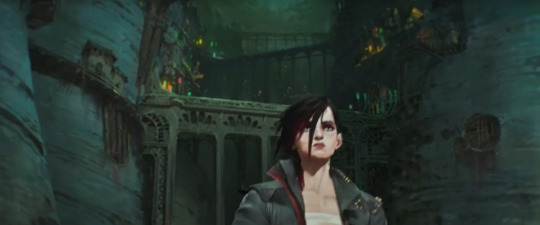
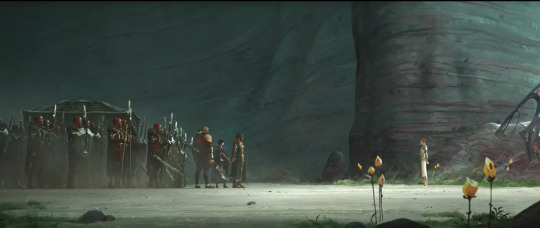
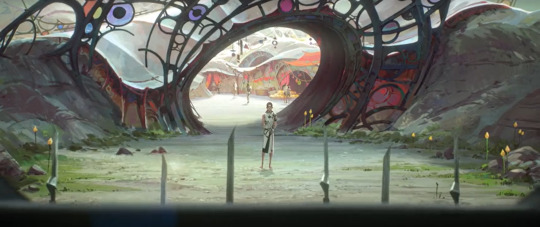

For the suffering Zaunites, they have everything they could possibly want: food, water, shelter, rest, belonging, peace, survival; the life that they once could only dream of having. It's perfect. They don't have to be in pain, not anymore.
But the commune is isolated. This is very much seen in the gate symbolism: all are welcome, but once inside, you'll never want to leave. You'll never have to. Because to be cured by the hands of the Herald means to bear his mark. To be saved is to bind yourself to him.

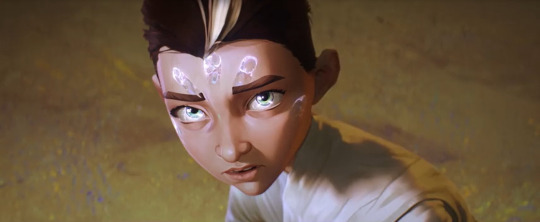
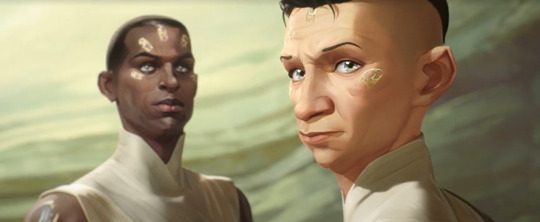
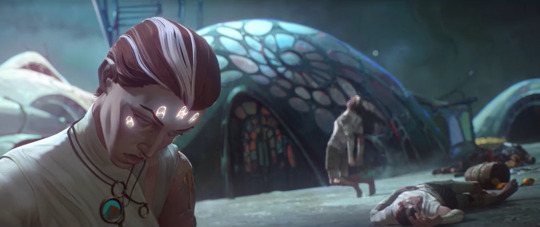
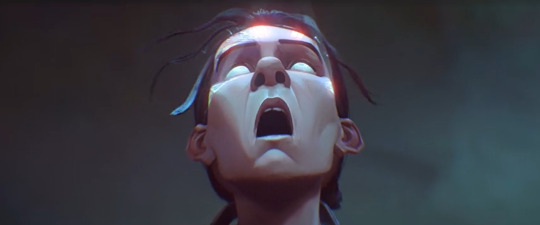

The open archway is also a taunt: the gate is open, it'll always be open, but would you ever risk going back out? Would you really trade this for anything else?
Are you truly willing to leave paradise? Are you truly willing to part with the Arcane?
The Arcane, which had given them everything they'd yearned for through Viktor.



Now, see here: Vi catches a glimpse of Singed exiting Viktor's abode. It's presumably the healing tent, as his main 'bubble' (the place where he 'recharges', so to speak) is the one in the distance.
The point is: Vi sees Singed leave the healing tent. What makes this suspicious is the fact that the man left unhealed.
Note that, prior to this point, the sisters have reconciled and were even willing to stay in this little underground haven despite their initial scepticisms. They, just like everyone else, have been lulled into the comfort the commune provided. So, to see someone else suddenly exiting Viktor's watch—someone with no traces of the Herald's touch, someone who's still bandaged and deformed—is a wake-up call.
Why else would you go into the healing tent, to the commune, if not to have yourself cured or seek respite? Why is this man, who'd obviously be easier work to deal with compared to Vander, not 'saved'?
Vi follows him. Then, Singed leaves the commune entirely.
In her eyes, someone had willingly turned away from 'paradise'.

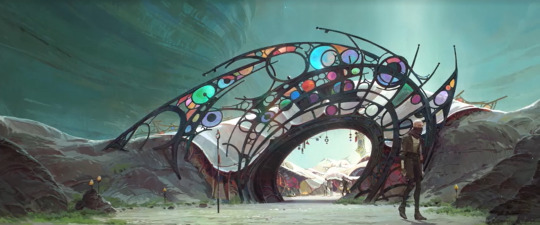

Logically, this begs the question: Why?
Because that's where the fantasy ends.
Right as Vi comes to the gate, the camera cuts to that Noxian spear upfront. A threat to the 'perfection' that existed within the borders. A reminder that the world outside still exists; a world that Viktor hasn't touched in its entirety, a world that still begs to be saved, a world that is still human at its core brimming and simmering.
That's the reason Viktor's named a herald: he's an omen. He'd brought about a transformation to those he healed. To the slums. Providing a drastic shift in people's lives (or whatever 'life' still counted for those he'd influenced) that left many devastated when Jayce blew a hole in his chest.
By spreading the use of the Arcane through other agents (again, the 'healed'), he essentially reproduced the effects of the power that he had at his disposal, while at the same time allowed himself to better comprehend how the Arcane worked—and by extension, allowed that very power to adapt.
But at the same time, he himself is also the key to undoing it.
From Jayce and Ekko, S2E3:
Viktor hypothesised that there may be something he called 'wild runes'. Patterns that occur naturally when the border between our world and the Arcane is thin. Runes like the ones you use in Hextech. What's the difference between those and wild runes? Pass me a tome. So, I used words you understood in order to elicit your action. This is what Hextech runes are. Pass me a tome. Pass me a tome! There—you sighed. Still a kind of language. A sound, but not words. Something raw; natural. That's wild runes. In most places, the Arcane is dormant—but here and there, it's more active. Wild runes are— —sort of like its fingerprints. Exactly! ...so, you're telling me: that pattern is on my tree, because you pissed the Arcane off with all your demands?
Viktor being infused with the Hexcore—which we can reasonably assume is a wild rune, as can also be seen with its matrix—makes it so that he himself acts as what a Hextech rune would do to it (the Hexcore). Through Viktor, the Arcane is refined, and in a process that doesn't completely destabilise (compared to pure Hextech, as can be seen with the weapons). For Viktor to lose control or to be harmed means making that magic either go wild (the weapons) or make it dissipate (the commune).
That's why the fantasy 'ends' at the entrance of the commune: anything past that is out of Viktor's reach, and remains 'untouched' by the Arcane.
From Jinx, S1E5:
So, all about these runes: they form some sort of mathy, magicky gateway...to the realm of heebie-jeebies. And this turns it on!
Say it again: the runes make a gateway. The Hexcore was a rune matrix, an array of wild runes that formed a singular entity. An entity which is now 'one' with Viktor. It means being the 'Herald' is also being the 'gateway' for the Arcane. The traditional role of a herald is to proclaim and carry messages; we don't know what message the Arcane itself wants to send, but we do know for a fact that Viktor is at least doing its work in creating that commune in the slums of Zaun.
From Singed, S1E6 & S2E6:
The mutation must survive. You must survive, Viktor.
The Machine Herald himself is self-replicating and self-annihilating. He can 'cure' the afflicted, thus infusing the Arcane into other individuals and replicating its structure inside them. And at the same time, the Arcane is also what 'kills' him—with Jayce using (what looked to be a mutated version of) the hexcrystal of his hammer to blow through Viktor's chest, where we know the Hexcore was placed during Jayce's revival of him in Act 1.
This is why the commune, despite its purpose as a safe haven, also exists as a place of great danger. Why it really isn't all That™, even despite Viktor creating it as a safe space for many.
See this exchange between Vi and Jinx:
This place...do you think it could actually work? Underground utopia, run by a skinny tin Machine Herald. Maybe when Piltover slides into the Sump.
Jinx was right in calling it for what it is, despite the words being in jest. A utopia. Working 'when Piltover slides into the Sump'.
It's an impractical scheme. Too perfect. Too good to be true.
An impossibility.
Do you believe in fate, Doctor? Our paths carved before us. Guided by an invisible hand? Not fate. Evolution. Nature's greatest force, forever in flux. No. Evolution has a destination. Not to combat nature, but to supersede it. The final, glorious evolution. But he isn't a specimen—he's a man. And he needs my help. I will not sacrifice his humanity for your cause. You may leave. Very well. But I assume you understand already: if you perish, this community is soon to follow.
Viktor understands. He understands. He just wasn't ready to admit it to himself when Singed said it.
I understand now. The message hidden within the pattern. The reason for our failures in the commune. The doctor was right—it's inescapable. Humanity.
Human nature and human essence aren't self-sustaining. That's why the Arcane was so effective in 'healing' all those people. Their humanity hampered them from healing themselves; both in the sense of the human bodily condition (the limits of the physical self), and in the sense of humaneness (of empathy, of choice). The human body cannot survive its own traumas without an artificial means of a cure (case in point: Vander). And the Arcane acted as its solution.
Mere instinct doesn't let you live—you need to learn how to direct your life after survival. To adapt. To grow. Humanity, self-replicating and self-annihilating; the escape from that cycle, that's the glorious evolution Viktor speaks of.
A utopia. Impossible and impractical. Humanity: that which inspires us to our greatest good, and the cause of our greatest evil.

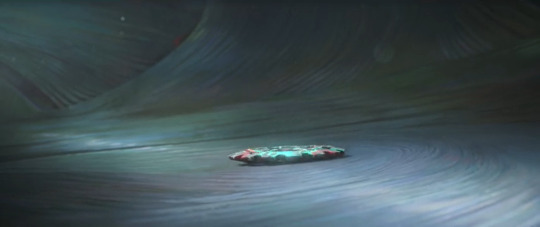

79 notes
·
View notes
Text
S2E2 - The Clue Write Up P5 -Land of Uz: from a little alone time in the cellar to the return to present day

I’m hoping to get to the end of this Land of Uz segment in this part so let’s get stuck straight in from the beginning of the scene after the kids have been transformed into lizards. There’s a bit of Aziracrow backstory confirmed here, which is that Crawley is already drinking alcohol at this point in the chronology. We don’t see Aziraphale drinking alcohol until 42AD, some 2500 years later. I’d love to know when and what changed his stance on this one, seeing as he’s very clearly anti-alcohol at this point in the history.

Crawley on the other hand is very comfortable not only with the consumption, but also with the possibility of the side effects of human wine. His ability to assess the quality of the wine on offer would also suggest that he’s been doing this for a while, and even though it would seem Aziraphale has never seen him do it before, the demon doesn’t think twice about pouring and offering a cup to him - there’s just an assumption that it’s a perfectly normal thing for them to do. I do wonder if Crawley’s decision to drink alcohol evolved from whatever fall-out there was following the flood, seeing as we don’t have any indication that this is behaviour he engaged in prior to that. Whatever his reasoning, he can clearly see he’s not going to win this battle, deciding to try his luck instead with getting the angel to eat.

Now, we all know that what follows in this scene is probably one of the fandom’s favourite scenes across both seasons, so true to fashion I am not going to delve deep into it. What I do want to make a little comment on is how Crawley manages to persuade Aziraphale to give the food a try, because it’s pretty clever. First off, he anticipates the protests and uses the angel’s own justification about alcohol by positing that food should be considered differently because it doesn’t cause drunkenness. After all, that was the only argument that Aziraphale really gave for not trying the wine just seconds before. Ergo, no drunken consequences theoretically means no argument for not imbibing. What really tips the scales is that he presents Aziraphale with the ability to partake of the food of his own free will. He literally presents the gift of “choice” to the angel on a silver platter. He even makes the situation explicitly clear to him as he does so:
CRAWLEY: You’re free to try the food.
Given we identified Aziraphale’s desire for the ability to exercise personal choice in the scene in the courtyard a short time ago, this is a really smart card for Crawley to play. So smart in fact that Aziraphale doesn’t really put up much of a fight about it, even if he tries to make a big song and dance about how repulsive the whole thing supposedly is.


And there really is no mistaking how pleased Crawley is with this turn of events, is there?

The only thing I wonder about here is whether the demon had any idea about what feelings he was about to set fire to in getting to see Aziraphale eat. He is a demon after all, so I have no doubt that there is a part of him that talked the angel into consuming human food because it would be a lovely little victory to add to his collection, at least in the lead up to the event. I don’t think that motivation is what keeps him staring whilst Aziraphale gorges himself though, most definitely not, despite the fact that this is some of the sloppiest eating I’ve ever seen somebody do (and I’ve watched every episode of Adam Richman’s Man vs. Food). When did he know that the enjoyment he got out of watching Aziraphale eat wasn’t actually driven by a desire to turn another being away from their standards? I’m pretty sure he knows by the time we see them at the Ritz after Adam was born, but there are 3000 years between these two events. He may know as early as Rome, given his not-so-subtle hints about never having eaten an oyster before paves the way for he and Aziraphale to go for dinner together. Whenever he comes to the realisation, I don’t think there’s a person on Earth that could argue that watching the angel eat in the cellar has Crawley thirsting for something other than wine.

Well despite Crawley’s assurances about not being able to get drunk on food, Aziraphale has more than a little hint of intoxication about him going on here. And where exactly is he putting all of that food?! There’s barely more than bones left. IT WAS AN ENTIRE OX. In fairness, he must have been at it a while, because even Crawley looks bored by the gluttonous display going on in front of him.

There’s something about this little exchange that really tugs at my heart strings, and I think it’s because Aziraphale’s words suggest that this is him making an effort to understand Crawley. Not just knowing him, or liking him, or whatever else, but actually understanding the demon. Not only that, it’s pretty clear that he feels that a lonely state of mind isn’t something he wants for this being, despite the fact that they’re supposed to be mortal enemies, and he doesn’t look particularly convinced at Crawley’s insistence that he’s misread the situation either.
I don’t think I’d be breaking any ground in saying Crawley’s challenge to Aziraphale’s oath of allegiance to God, and the response to it, remind us that the angel has been teetering on the edge of being able to rationalise said allegiance for quite some time. It’s an interesting thought process to witness though - the staunch assertion of loyalty so quickly cast into doubt with Crawley’s reminder of the cruelty in the side Aziraphale is aligned with. It’s no wonder he looks so devastated when he considers the reality that his side could in fact be responsible for an act that he has been so painfully trying to stop Crawley from doing because it’s so inherently awful.

I find it interesting at this point to see Aziraphale effectively admitting defeat by returning to the food. He has no response to Crawley’s gleeful acknowledgement of the doubt he’s planted. Nothing. Not even an “I forgive you”. It got me to thinking whether we see Aziraphale accepting that he’s lost an argument anywhere else. And I don’t mean acceptance that they’ve reached an impasse or losing control of his emotions and saying something he’ll regret later, but actually realising that his point of view has fatal flaws that cannot be reconciled in the face of reason. In previous discussions of this nature, he’s usually been successful in justifying the terrible acts done in Heaven’s name with some sort of meaningless reasoning (God is going to make a rainbow afterwards for example, or the ever-faithful “ineffable plan” motif), but here, challenged with the notion that his side has seen fit to endorse the killing of innocents for no other reason than to win a bet, he’s lost for words. Uncomfortable as he might have been with casting Adam and Eve out of the garden, or the Great Flood, this particular cruelty looks to be something causing something of a revelation for him.

Quick note on Crawley’s challenge to Aziraphale’s apparent blasphemy.
CRAWLEY: Blasphemy, angel? That’s not like you.
It wasn’t 24 hours prior that Crawley was making it very clear to Aziraphale that they didn’t know each other at all. Yet this line is delivered with such familiarity, it’s impossible to think that the relationship between the pair is anything other than convivial. Leading on from that, I do find myself wondering how the rest of that night in the cellar panned out. What did they talk about? Did Aziraphale eat the rest of the ox? Did he perhaps try some alcohol? The use of the banner declaring that we’re now looking at “the next day” just feels like there’s a real emphasis on the amount of time that’s passed between these two scenes; the possibilities feel quite vast.
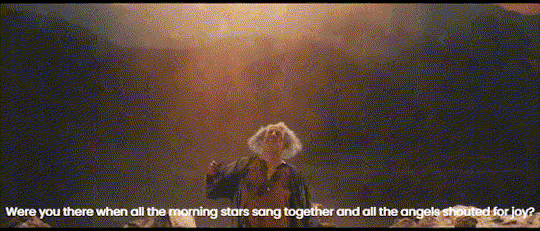
There’s that line: the one that started this whole flashback process off in the first place. And as previously noted, as far as we can see the only beings present for it were God, Job, Crawley and Aziraphale. It’s possible Gabriel was with God in Heaven whilst she spoke to Job I suppose, but I like the possibilities that open up if we consider that the line Jim utters that turns his eyes briefly purple is a line that he shouldn’t have any knowledge of even if he had his Gabriel memories.
I love the return of the whale motif in Job’s recanting to Sitis, even though we don’t actually hear God saying anything about them in her speech. I did some light research about the reasoning for the whale appearances and couldn’t find anything concrete, but there’s a fair amount of speculation that it might be in homage to Douglas Adams, whales featuring heavily in the Hitchhiker’s Guide to the Galaxy books There is this though:
A quick note on pronouns here (something which I seem to finding more and more of note about as the show goes on). Sitis refers to God here using they/them pronouns. We heard Aziraphale using the she/her pronouns that we’ve become accustomed to hearing as recently as in the cellar, and the voice we hear in the previous scene remains feminine. I think the use of they/them might just be a scriptual loophole - I think both Job and Sitis would have been harbouring under the concept that God was a male figure, and that the knowledge that God is in fact feminine appears to be something that only agents of Heaven and Hell are privy to. Perhaps it’s just a quirk of the script - was it considered too confusing for Sitis to use he/him pronouns at this point? Settling instead for they/them as a compromise? That’s the only reason I can really come up with, because it feels slightly awkward to me.

There’s that devastated angel look again, and this time it comes with a little gulp as Aziraphale bears witness to the overwhelming grief that Heaven has inflicted so nonchalantly onto God’s most faithful servant. The juxtapositioning of his devastation against Gabriel’s cheery obliviousness, not to mention the music and the sounds of Job weeping in the background, makes it all the more painful for us to watch.

Whilst there’s no mistaking the relief on Aziraphale’s features (quickly followed by a look of guilt), I think it notable that none of the other angels from Heaven recognise Crawley, either as a demon or a former angel. Considering he has already been referred to (in the present day, which is in the future from where we are in this episode. Confusing much?) as part of a group of demons that were cast out, and that he is the one carrying out the orders from Satan that would see the bet with God settled, it seems likely that they might recognise him. I suspect this is simply one of those times when storyline convenience won out over the need to ensure that the script was plothole-free. I also think it worth noting that the moment Crawley enters the scene is the very moment he knows things are about to turn very ugly for Job and Sitis, choosing to step in and try to rescue to situation. He’s just a natural rescuer, isn’t he? Could this be the moment Aziraphale’s love of being rescued by him started to form? It certainly speaks to the demon’s true character if nothing else, which is that deep down, he really is quite a nice person…

Well, if we weren’t aware of Aziraphale’s frustrations with Heaven and its agents, he makes it painfully obvious when Michael decides to give an explanation of the origin of Crawley’s fake name. How he gets away with this eye roll in the presence of so many other beings, I have no idea: not even Crawley seems aware of it, concentrating on Michael’s irritatingly accurate debunking of his cover story as he is. There are two things about this scene at this point that I think are worth noting. For the first, let’s take a high-level overview of everything that’s going on here - a renegade demon and angel are trying to bluff their way out of trouble with some high-ranking angels having low-key thwarted the will of God. The soundtrack has some delicate pizzicato (that’s plucked, for those who aren’t musically minded) strings in the background, providing a comic feel to the scene, whilst in the background we can hear Job sobbing uncontrollably. The dialogue content feels perilous, but the delivery and subtext make it feel mischievous, seeing as Aziraphale is using his knowledge of the ignorance of the rest of the Heavenly host against them. All of those things brought together in one place makes the whole thing feel so… I think the word is uncomfortable. I think this is really clever - bringing tension into a scene using the juxtaposition of opposing elements means that we as an audience feel uncomfortable but can’t necessarily identify why.
The second of those two things I want to comment on here is that this scene is a good example of what happens when Aziraphale and Crawley have gotten their unspoken communication on point. They’re working together so effortlessly here - both taking cues from the other’s improvisations and instinctively knowing what the next play is supposed to be. They even manage to come up with some coded verbal communication for each other on the fly, and for it to be successful. If only they had been this switched on for the final 15, I suspect season two would have ended very differently.

See now, wouldya just look at that? Aziraphale knows exactly what to do with little more than a look and hand gesture from Crawley. Something else of note here is the appearance of the “trust me” theme we see running through season two, this time with the prompt coming from Crawley. Granted, Sitis does look rather perplexed about what exactly is going on, but didn’t she figure out the “Bildad the Shuhite” was the one responsible for all of Job’s misery earlier on the episode? I find it a bit of a stretch to think that she would just go along with the façade, rather than identifying Crawley as the troublemaker to the others in the room at the time. I do love that the demon sounds so earnest in his plea to be trusted - he would know very well that he’s not supposed to be trustworthy (he even tells Aziraphale that’s the case twice in this episode), so his desperation for Sitis to go along with him should tell us (not that we needed telling) that this is his true character.
The contact between Aziraphale and Job looks to be the first (chronologically speaking) sleight of hand trick that the angel has done, just a couple of millennia before he repeatedly demonstrates that he’s actually very bad at it. Except when it really counts, as this instance (and one later on in the season) shows. And those bones that appear from Job’s robes are the proof that Aziraphale has well and truly given in to gluttony - they are PICKED CLEAN:

Quick note on the noise used for Aziraphale’s miracle as he turns the lizards back into children - it’s very close to the ones we’ve heard in this season from his already, the ones which are driven by need rather than intent, so I’m still not ruling that possibility out.
Alright last note about this section of the minisode, and then I’m calling it for this part. There’s something that goes unspoken, but is definitely implied, in Aziraphale’s choice to lie to Gabriel about the children. He actually gives his word “as an angel” that he’s telling the truth. I mean, does that not speak volumes about his mindset here? He verbally surrenders the very nature of his being in order to save a couple of children and maintain Crawley’s cover, the former of which supposedly goes directly against God’s wishes, despite the fact that he is so adamantly on her side. He’s earned Crawley’s respect though, so maybe it was all worth it in the end.

Alright, that’s the lot for this part. I think I should be able to get this episode wrapped up in the next one, which puts me one episode closer to being able to finish my WIP fic! For now though, and as always, questions, comments, discussion, always welcome. See you for the next one!
#good omens#episode analysis#good omens season 2#aziracrow#ineffable idiots#aziraphale#crowley#good omens soundtrack#aziraphale loves food#crowley loves watching aziraphale eat
29 notes
·
View notes
Text

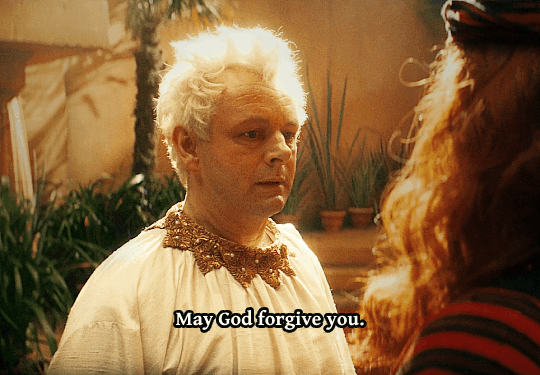
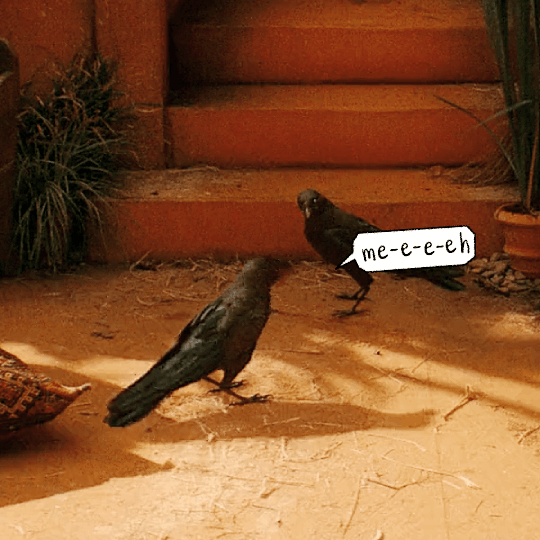
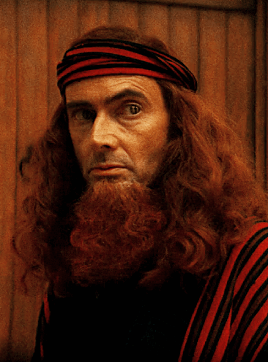
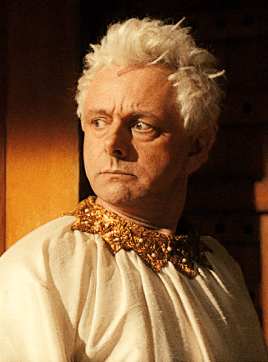
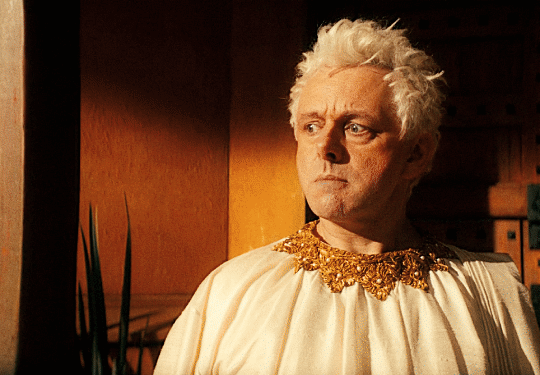

Then you tell me that you want to do this. You look me in the eye and tell me.
#good omens#good omens 2#good omens 2 spoilers#crowley#aziraphale#i cannot express how much i love this whole minisode#by far one of my favorite parts of s2#and bless michael sheen for that face#i mean - in general‚ but specifically the last gif#gifs#s2e2 'The Clue'#minisode 'A Companion to Owls'#i made this#can't say i'm particularly happy with the second one... or the last... but it's not terrible i guess#i am Still Learning Gifs that's for sure#also if i have to fix the italic text or gif alignment one more time i'm gonna scream wtf tumblr
732 notes
·
View notes
Text
Everything You Ever Wanted to Know About The Crow Road, But Couldn't Get Through it To Find Out
Co-written by dbacklot and cheeseplants
WARNING: SPOILERS EVERYWHERE!!
Overall Premise: Books are clearly important to Good Omens and Neil & team have left us Clues. In S2E2, the xray trivia highlights a list of books they would like the audience to read. But even more specifically, there are names of certain books on the back of the chairs in the theater in the opening credits. Those books are: The Tale of Two Cities, Pride & Prejudice, and The Crow Road - twice!
What might this mean? One theory is that the chairs represent the seasons. The body swap in S1 is similar to how Carton, in Tale of Two Cities, takes his doppleganger's place in jail, sacrificing his life so Darnay could go free and be with his family. Pride & Prejudice is clearly referenced in S2, with Crowley's proposal as a sort of mirror to Darcy's first proposal. (There's probably a whole lot more to unpack there - and if you like Austen, here are some thoughts about Aziraphale's favorite book, Persuasion, and how it may relate to the characters.)
BACK to The Crow Road. The title is shown on two chairs in the opening sequence, suggesting that it is related to both S2 and S3. Furthermore, we see the book multiple times in the show and it's the book Muriel reads at the end. As an aside, Neil Gaiman and Iain Banks were very good friends. Iain Banks died over a decade ago, so it is also likely a bit of a tribute to his friend.
So let's dig in and see why perhaps Neil keeps holding this book up and shouting Clue!
Side note: The book is long and most of the action happens in the final third, which can make it a hard read for folks. There's also a lot of characters and it can be tricky to remember how they are all related. There is a family tree BUT it has spoilers.
The Name: The Crow Road is a phrase used by the grandmother to indicate someone has died, ie - he's gone the crow road.
The Plot: This is the story of Prentice growing up with his immediate and extended family in Scotland. His Uncle Rory disappears in his early childhood. Some family members choose to believe Rory is still alive. After a hook-up with his Uncle Rory's former girlfriend as a young adult, Prentice starts gathering journals and writings from his missing Uncle Rory, who was (for a few years) a successful writer and traveler. Prentice eventually learns that 1) another Uncle, Fergus, had murdered his own wife and covered it up as a car accident and 2) Rory had figured this out and confronted him. Fergus then murdered Rory, hid all the evidence, and hired an acquaintance (who also traveled) to send matchboxes from bars across the world to Prentice's father, Kenneth. Kenneth, believed - as Fergus intended - that these were messages from Rory, indicating he was still alive.
Stylistically, Prentice's childhood memories and fragments from Rory's journals are interspersed throughout the book, much like the minisodes are in S2. It can take the reader a while to figure out who is telling the story or where this information is coming from. It is also unclear how reliable Rory is as narrator - perhaps this also plays into S2.
What it Might Mean:
Fergus could represent the Metatron. He is very powerful, rich, and conservative; he lives in a castle (Heaven?) and wants authority. Fergus also murders two relatives and hides those murders; the murder of his wife may have been inspired by jealousy over her sleeping with another man, an event which may or may not have happened.
Fergus also sets up fake messages!! The matchbooks are red herrings to make it look like Rory is still alive. As the Metatron relays messages from God, I can't get over the possibilities here. We have seen God speaking directly as recently as Job, but are the other messages real?
I can't help but wonder if the matchbooks and their use as messages inspired Neil to use the matchbook in S2. The matchbook in S2, incidentally, connects to all three minisodes - the quote from Job, 41:19 (reversed 1941), and the matchbox is from the Resurrectionists pub. So the matchbook contains not only Gabriel’s memories but refers to Azi’s as well?
Much of the book is about this missing uncle. Is a character (or their memory) missing in S3? I have theories, but its too soon to tell.
There's also an interesting theme of Prentice collecting his Uncle Rory's writings and records, including sending some corrupted computer discs to an expert in America to try to restore them. Given the emphasis on records ("It contains information in a tuneful way") and journals in S2, not to mention this trivia nugget - my brain is itching that there's a connection there.
Faith & Beliefs: The book talks about Faith a lot. Prentice believes in God and his father Kenneth doesn’t. And Kenneth doesn’t just reject religion, he wants his children to reject religion too. Prentice on the other hand desperately wants something to believe in - especially after a friend's death in an accident. This leads to a huge fall out - they end up not talking over it.
"'I mean, what's the big argument? Can't you just agree to disagree?' 'No; we disagree about that,' I shook my head. 'Seriously; it doesnt' work that way; neither of us can leave it alone. There's almost nothing either of us can say that can't be taken the wrong way, with a bit of imagination. It's like being married.'" (Ch 7)
Kennth seemingly taunts God - he climbs a church during a lightning storm and is struck dead. His uncle Hamish (one of Kenneth’s brothers) also represents the extreme version of Faith and ends up running a sort of cult, at least until Kenneth’s death.
What it Might Mean: The thread they pull through a lot is about meaning, and whether you can have meaning in life without God. Prentice gains Faith because his friend died senselessly; he wonders how can you have a world be so cruel. There must be a reason for it (this is sort of Az coded), and he turns to God to create the meaning for him.
BUT Kenneth’s argument is that you don’t need Faith for the world to have meaning (or at least that is my reading). It is wonderful because it is inherently meaningless (this is very existentialist, but I do think that’s the point). That Faith doesn’t do that, and just means you are looking outwards without looking at what is right in front of you. Which again, could be a Crowley way of looking at it, or at least where he is headed. Life is good as life, and doesn’t need God to make it so.
Hamish represents someone putting so much meaning into Faith that they lose all sense of Joy, he becomes distant. (One of my favorite scenes is Hamish doing a jigsaw puzzle with the pieces upside down - and cutting the pieces with scissors if they don’t fit right!)
The Romantic Relationships: Prentice is infatuated with a cousin (second cousin?), Verity. She is described as beautiful, in white/light colors, pure, lives with Uncle Fergus in the castle. There are legends around her birth - she was conceived under a tree during a storm. She is unattainable and eventually ends up with Prentice's older brother.
Ash, on the other hand, is almost literally the girl next door and Prentice’s long-term best friend. Her family is poorer and maybe has some domestic violence issues. She's always there for Prentice - literally a shoulder to cry on, sharing a bottle of whiskey, helping him sober up after said whiskey. There's obvious romantic tension from Ash’s side but she never pushes him and instead guides him along. And the book ends with a romantic resolution that feels very much like the final fifteen - except with a happier ending.
“- and I still didn’t feel I could tell her how I felt about her because she was going away now, and how could I suddenly say I love you when I’d never said it to anybody in my life before? How could I say it now especially, the night before she was due to leave? It would look like I was trying to make her stay, or just get her into bed. It would probably wreck this one precious evening that we did have, and upset her, confuse her, even hurt her, and I didn’t want to do any of that.” (Ch 13)
They finally kiss and spend the night together, both confessing their love. Ash has to leave the next morning to pursue a career opportunity in New York; Prentice is sad that she goes but re-dedicating himself to his studies and working towards a relationship together.
What it Might Mean: To me, Verity is very Heaven-coded and Ash is very Hell-coded. A big part of Prentice's arc (Prentice may represent Azi here) is getting over his blind infatuation with Verity and realizing the value and love he has with Ash. However, they also need to be apart and grow a bit before they can be together.
Other thoughts? Connections? Would love to hear your theories!!
@cheeseplants
#good omens#good omens s2#good omens 2#good omens thoughts#final fifteen#good omens meta#the crow road
114 notes
·
View notes
Text
Episode 2: “The Clue” / “A Companion To Owls”
Good Omens 2 Episode 2 liveblog! Beware spoilers!!
- Crowley is such a troll in this opening scene. I've come around on the beard/glasses combo. He looks like a wisecracking talking Disney goat.
---
- Jon Hamm’s impression of Buddy Holly is amazing. “Ah-hey, ah-hey-hey” yes give me those weird, grandpa-like hiccups.
---
- I can hear a fly during the zoom in on sleeping Crowley in the Bentley... does Beez have one spy in the bookshop and one on Crowley at all times?
- Hmmm, Shax tells Crowley right away about Heaven detecting the miracle. That could be evidence for my Beelzebub theory, I guess...? Beez wants Crowley kept informed about the danger, so that he’ll continue to keep Gabriel safe, but they get to keep up plausible deniability with Shax and the other demons that they’re only threatening Crowley.
- Poor Shax. Crowley’s bullying her.
- LOL are all the other demons afraid of driving at high speeds? (See: Hastur.) All he had to do to get rid of Shax was rev the engine.
---
- I like Maggie, but she’s a little clingy with Aziraphale. You’d think the euphoria of having 8 months of overdue rent forgiven would have lasted longer than 24 hours. On the other hand, her encyclopaedic knowledge of music history is really cool.
- Aziraphale conducting every time he sings Everyday is the cutest thing ever.
---
- Crowley orders Talisker! I assume John Finnemore insisted.
- OMG, Mr. Brown is holding a newspaper with THEE headline in it about the Nebraska woman who taught her duck to play the accordion.
- “Get humans wet, and staring into each others’ eyes. Vavoom.” I. I don’t think Crowley knows where babies come from either.
- THAT JANE AUSTEN LORE. AND CROWLEY DISAPPROVES?? SHE SOUNDS AWESOME
---
- Aziraphale is so hesitant when he says he doesn’t think God wants to kill Job’s children, and so utterly certain when he says he knows Crowley doesn’t want to. He already has more faith in Crowley’s mercy than God’s. 😭
- THE UNBELIEVABLE LEVELS OF SASS
- OK Ty Tennant is very funny
- Both the older kids treating Aziraphale like a waiter is hilarious actually, as is Jemima wanting to be a blue lizard and Crowley obliging
- I’ve been jossed a bunch already this season, but the biggest shock to my system by far is Crowley tempting Aziraphale into enjoying human food. I genuinely assumed Aziraphale has been nibbling on whatever was around to nibble on since he was first deployed on Earth. It took him a millennia and a half to try barbeque?? Poor deprived bb
- Whoever wrote that post about Aziraphale discovering honey and tearing into a beehive like an especially feral Winnie The Pooh, I hope they’re patting themself on the back right now.
- I am more into the sight of Michael Sheen falling onto an entire ox corpse like a starving werewolf than I am comfortable with, but fine, I guess this is who I am now.
- ALL I’M SAYING IS, Crowley and Aziraphale’s first kiss had better go EXACTLY like this.
---
- I’m here for hungover Crowley wobbling across the sand.
- I suspect this minisode is difficult to follow for any viewers who didn’t swot up on the Book of Job a fortnight or so ago, like I assume we all did.
- Michael is the only angel in this scene who possesses more than a single braincell, but they’re all clearly thick as can be. The only people thicker than them are Job and Ennon, who are somehow even worse at lying than Aziraphale and Crowley.
- Crowley has such immense fucking panache this entire episode. I do love him and his terrible beard.
---
- That little tongue in cheek thing Aziraphale does on “investigation” - he cannot get any cuter now. it’s literally impossible. please.
- Crowley slapped his hand omg
---
- Oh god, the conversation on the bench... Aziraphale is in actual tears, and Crowley is so wry and gentle and reassuring, even while delivering words that are, taken on their own, a stark form of comfort. He’s just a calm presence while Aziraphale experiences shrimp emotions on the other side of the bench. I can’t even speak about Aziraphale, honestly, but I’ll give it a shot... he is so brave and scared 😭😭😭 Hell?? He really thought he belonged in Hell? Crowley was absolutely right to gently laugh at a notion that ridiculous (and awful) (and then again, Crowley also used to be a sweet little curly-headed bunny of an angel, and look at the unspeakable thing that happened to him). There’s that little moment where Crowley says he’s not going to tell anyone, and asks Aziraphale if he’s going to tell anyone, and Aziraphale gives this little ashamed headshake, like he’s realising for the first time that he’s not, he’s willing to lie (by omission) about this too. And then he glances at the sky, as if verifying that God isn’t going to send down a thunderbolt, and realises that he’s actually safe. There aren’t going to be any consequences; he’s going to get away with it. And that’s almost worse, the idea that he doesn’t live in a world with clearly defined rules, and he truly can’t predict what God thinks, or what she is going to do. She spoke directly to Job, but she’s a closed book to Aziraphale.
---
- The ending credits are on fire so far this season.
---
Right, um, next up, an episode I haven��t already seen. asdhkagsd.
#good omens#good omens 2#good omens 2 spoilers#good omens 2 liveblog#good omens s2e2#The Clue#A Companion To Owls
9 notes
·
View notes
Text
The grand unified theory of Good Omens S2 hangs on - you guessed it - a double meaning (and art). *Part 2*
Part 1 l Part 2 l Part 3 l Part 4 l Part 5 l The End?
This is major spoilers for season 3 territory. You have been warned. I'm also going to split this into parts because wow, I have so many ✨Clues✨! Come with me on a long and magical journey through time, and trust that I will bring you back to the double meaning of it all very soon.
The second thing that Oofs and Ouches my Bones specifically about the art direction in S2 are the time/place cards. You know, the good old rope and stick cards we all know and love are back in S2E1! - wait a minute...
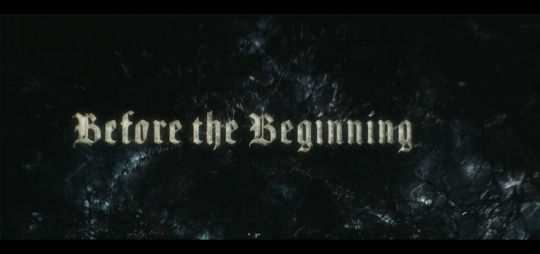
Oh. Okay. I guess we're going with a huge organ swell happening in the music at the same time as a gothic font. Seems... awfully religious of them. Let's try again. S2E2?
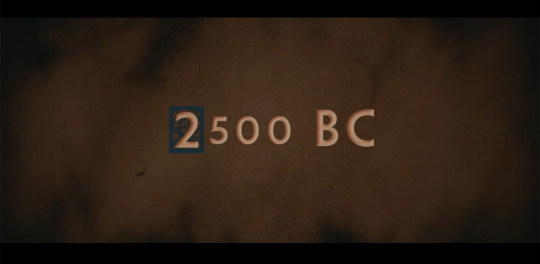
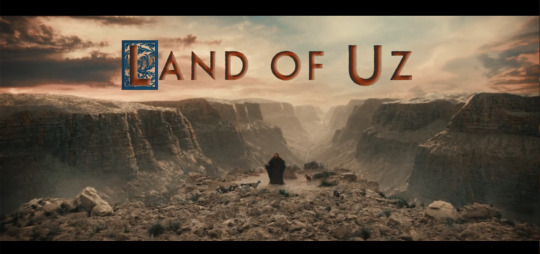
Oh shit. 1950s classic Hollywood biblical epic title cards? Really? Okay. But we've already been to London in 1941 in S1 so surely they would just use the same exact title card as last season because it's the SAME SCENE in S2E4 and-
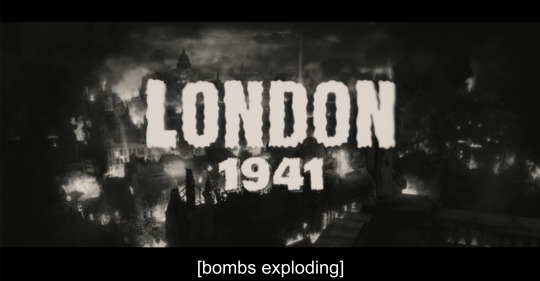
OH GOD it's a black and white classic horror flick! Be afraid! Cower in fear from the zombies that eat brains. So...I think we're getting a feeling this season that they massively changed up the art direction for the all the Minisode title cards. Except did they? Wait, how did the Resurectionists Minisode start?
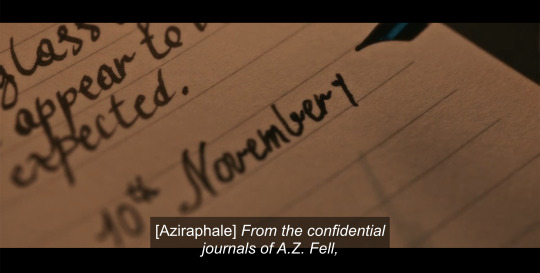
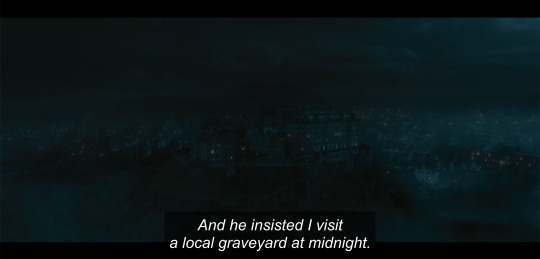
That seems... very normal. No crazy "Hollywood" title cards here. And they just punted all the classic rope and stick cards that tell us when and where everything takes place in the whole season?
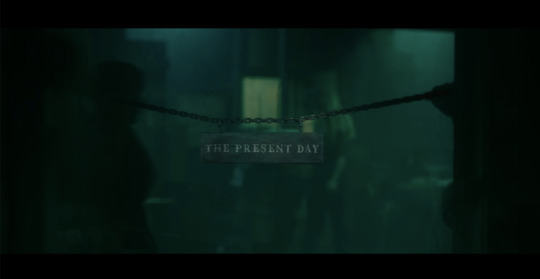
They did not. Y'all there are TWO competing ways of showing the audience Time/Place going on in the same episodes. One is canonically familiar, and the other is new, and very *hack-esque*. If only there was another reference to classic cinema somewhere in the title sequence of each episode to explain what was going on with these things AHHHHHHH-
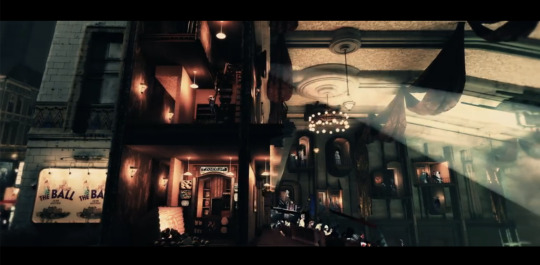
(If you haven't watched till the end of the opening credits) There's a dude with a big stick waving something in front of the projector in the booth each episode, and presumably this has an impact on what we see on the literal movie screen projecting bits of the story in front of us. So what do we see in front of us from the projector each episode, exactly?
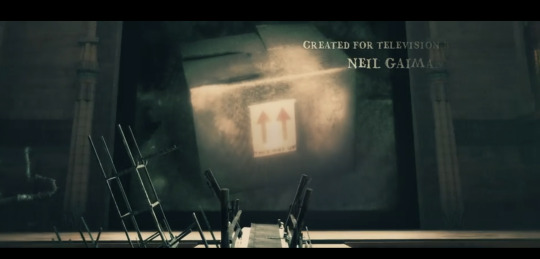
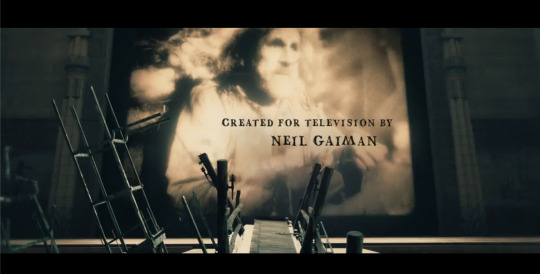
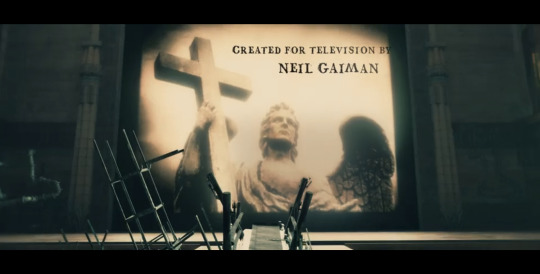
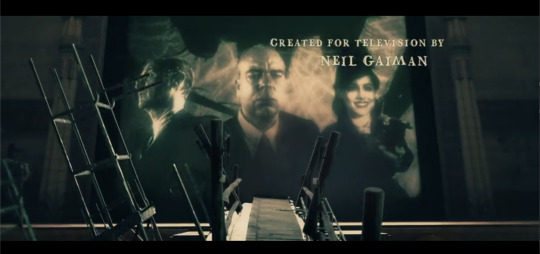
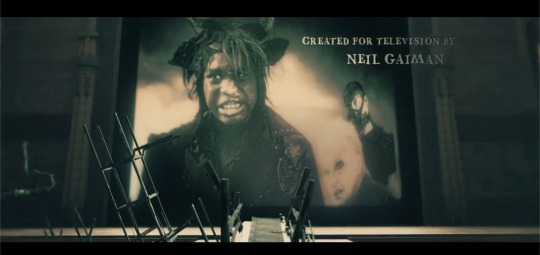
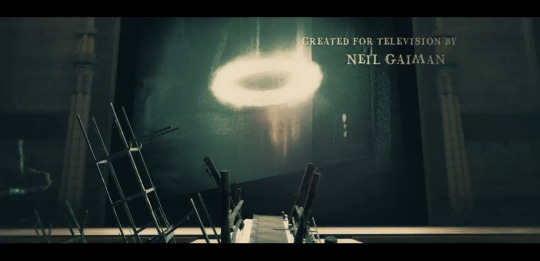
Well for one, we can certainly see that Neil Gaiman found a really interesting place to put his name in the openings... right over a lot of the fishy things in each minisode is a FUN WAY TO DO LAMPSHADING, NEIL. At this point you're screaming at me "But what does this have to do with the gangsters, and Maggie, and everything else?" My friend, I am here to tell you that I'm starting to get the feeling The Metatron has been adding bits and pieces (not very well, mind you, he's a hack writer) to change the outcome of season 2.
Would you like to see more clues, and the prestige reveal of what the double meaning is? Part 3 right here!
#good omens prime#go season 2#good omens season 2#go3#good omens s3#good omens 2#go meta#good omens meta#good omens spoilers#good omens season two#art director talks good omens
171 notes
·
View notes
Note
Going into season two, I was basically fifty-fifty if DM had happened in the past, I was also already okay with a reinterpretation of DM - in which past DM didn’t happen. Especially after the season premier, because I thought the tension between Daniel and Armand was great. I’m a little sad though that Daniel is already a vampire, because so much of what makes the DM relationship interesting and compelling is kinda related to it. I just don’t want it to be a cookie-cutter enemies-to-lovers - I can’t help but feel that would be a bit shallow. I want the relationship to have some depth and be actually romantic - you know? I see some speculation about a reverse chase, which could be cool - but Daniel doesn’t have a reason to chase Armand if he was turned out of spite. Unless he wants revenge, which given San Francisco is fair enough I guess. Also Rolin stating that the turning won’t be shown at any point and the decision not to show it made me lose some faith in the investment of the writers in the relationship tbh. I understand not showing it in s2 but never? I just feel like it’s even more of an important event if pastDM isn’t a thing. I’m happy to be proven wrong here, but I don’t know if I dare believe in what they have planned… but I’ll try to be more optimistic!
The three somewhat possible ”clues”/”hints” which might foreshadow a past DM are for me 1) Daniel’s comments about his memories of the 70s being ”all a blur” and waking up without any memory in a parking lot in Milwaukee 2) JA’s comments in the TV insider interview: “But I will say, I think that Louis and Daniel, maybe there was more there. I’m going to get in so much trouble,” he giggles. “I’m going to start talking about it all.” 3) The comment about Daniel feeling freer to hold Alice’s hand in Paris.
To go into more detail:
1. Could be nothing, just a way for the writers to add some context to Daniel believing at some point that he did black out, as it becomes more believable for Daniel to believe that if his memories of that time are somewhat muddled in general. However, that line of dialogue does feel a bit like a foreshadowing line - as if there is something more about this very specific mention of an instance of memory loss. And if there is, it raises the possibility of a book similarity, in which Armand after imprisoning Daniel decides to stalk and follow him. In the show it would ostensibly be to find out what makes him ’fascinating’
2. JA’s comments are wild! What is he referring to? One way to interpret them could be that he is implying that there might be some sexual tension between Louis and Daniel, which might be revisited next season. “I’m going to start talking about it all.” does sound like someone talking about future plot lines. Another reading could be that there has been some sort of relationship between them in the past, which is to be revealed. This is especially interesting given that scene in s2e2 where Daniel asks about, and Louis and Armand tell him, about all the ’young men’ they would date/drain. Th framing of that scene, with Daniel at one point in-between Louis and Armand, could be read as foreshadowing a revelation that Daniel was at one point of of these young men. Of course, again this could be nothing. Just simple foreshadowing of s2e5, about specifically Louis draining the young gay men of San Francisco. I would not say it foreshadows Daniel’s encounter with the two of them, since that had already been revealed in earlier episodes (even Armand being asked to ’join’).
3. This one I’m the most doubtful about. I don’t believe in general that Armand is being kind to Daniel in this scene. I believe that he is actually going full ”manipulative gremlin” and trying to divide and conquer Louis and Daniel, to ensure the truth of the trial and San Francisco doesn’t come out. He is the one who in the previous episode told Louis that they together could bring the more manageable ’boy’ back (and starts off the whole thing of digging into Daniel’s past with Alice) and in the next episode he tries to apologize to Daniel on Louis’ behalf. Armand telling Daniel about Alice’s reasoning behind her refusal, can also be read as a form of intimidation - similar to how Louis asks if they should look into what Alice thinks of Daniel now. He does arguably try to hold back Louis a bit at one point, which could be an acknowledgement of them going too far and being hurtful (or being him as speculated being caring of Daniel since they have a past) but could also be Armand starting to try to play the ’diplomat’ or ’nice vampire’ to Daniel. The reason Daniel gets a PTSD-flashback is also in my mind not because there’s a connection between Armand and Alice, a take I still see here and there, but because Louis diving into his memories and bringing them up is so similar to Armand doing it that it triggers a flashback. However, with all of that said - what does Louis mean when he states that Daniel felt freer to hold Alice’s hand in Paris? It could be a reference to Daniel walking around in Paris with a guy (who would be Armand), finding it easier to deal with his internalized homophobia in a country where no one knows him, but could also be as others have speculated, that Alice is not white. The thing that does invite speculation about this is that they don’t reveal what the reason is, but this could be because at some point the idea was to actually show scenes of Daniel and Alice in Paris as they were brought up. So perhaps, that was cut because it wasn’t deemed necessary, leaving us with a bit of an unresolved comment.
Overall I find JA’s comments to be the most compelling possible clue. Also because I feel that the scene of Louis and Armand telling Daniel about their ’young men’ hasn’t really been resolved? But that could be nothing. However, if Louis dated Daniel together with Armand in the 70’s I can’t believe that Louis wouldn’t’ tell Daniel, especially after their connection at the end of s2e5. An easy reason could be that Armand erased Louis’ memories and that he did this simultaneously as he erased Louis’ true memories of the San Fransisco incident. This would also explain why Armand used the language of ”abandoning him” when referring to leaving Daniel. But, that would mean that Louis and Armand at some point decided to reconnect with Daniel after they left him at the drug den, which doesn’t seem very likely to me. Possibly Daniel sought them out again - similar to seeking out Lestat in the book, as he does not remember Armand torturing him. However in such case, Daniel’s last memory of Louis is the latter attacking him, which would be sufficient reason for Daniel to not seek him out. So while I’m intrigued by JA’s comments and would find a past DM-plot line compelling I don’t know if I believe that where the show is going.
What do you think? Any clues you find more or less compelling? I would very much like to hear about where you think the DM relationship is going/how it will play out - and what you would like to see? Especially if, as I agree is likely, pastDM won’t be a thing. Thank you! Sorry for long post!
So I actually have an idea as to why Daniel would reverse chase Armand!
Daniel’s background in investigative journalism and “nailing” the subject (no matter how difficult) is one of the main reasons he pursued Louis.
Let’s take Louis’ words as fact and agree it was out of spite (and Armand is gone)- do we really think DANIEL would just sit back and shrug it off? He’s independent and wouldn’t need as much guidance as book Daniel, sure, but if there’s one thing Daniel doesn’t do is drop the freaking subject. He keeps at it, even at a detriment to himself (continuing to poke at Louis even after Louis messed with his Parkinson’s in s1).
I get the whole enemies to lovers comment you make, but I think it’s little more nuanced than that given the SF event and Armand’s overall history. I made a post a week ago saying it’s SO fucked that even after everything that happened in SF, Paris, with Louis, and what Daniel will learn Armand did in Lestat’s past, Daniel will STILL go to Armand.
Daniel has gone through two divorces, has two kids, two Pulitzers, etc. like this guy has so much history with relationships and is an overall incredibly intelligent man (albeit a little self-destructive) and will still go to the evil, evil Gremlin that is the vampire Armand. It’s kind of hilarious.
Okay, Rolin’s comments regarding the turning were very odd to me and still kind of irk me tbh. Like it was such a pivotal moment for Armand and he shrugged it off. I gotta remember Hannah’s comments regarding this and her trying to calm the fans down about Armand’s character arc. They 100% know it pissed fans off (and annoyed Eric and Assad), so maybe they have something on the back burner regarding that? Just a thought!
Regarding your theories-
1. I 100% believe Armand followed Daniel throughout the years because we can all agree he can never let anything go EVER. Also, if this were true I’d be interested to know why he still didn’t want Louis to do the interview (besides the SF erasure)… maybe seeing him again would spark his fascination.
2. Jacob is a Devil’s Minion fan so I do think his little comments come from something. I’m actually making a big post on this and why I believe it’s literally in the script. I don’t know how much Jacob would know outside his own character arc but the scripts might have been very telling…
3. They may have been doing a good cop, bad cop thing but I do think Armand felt some sort of pity for Daniel, especially if we believe he was there the day of the proposal (doing his stalker stuff). I think the constant Alice comments are going to be important in season 3, especially with Daniel facing his immortality and likely having to contact his family. We’ll see more about this, I’m sure, especially with Lestat bringing up his own family dynamic (Gabrielle having to watch her own family die, Lestat’s estrangement with her, etc). Maybe getting to see Daniel’s thoughts about his family and his own maker in contrast with Lestat’s?
Overall I’m excited to see where they’ll go. My biggest concern isn’t the will they/won’t they (because we know they will) but moreso how much present-day Armand we’ll even get. Really biased look at things because I know it’s TVL time (and Louis is still a main character!), but it genuinely spooks me that we might not see him til Lestat meets him in 1700s Paris.
I want more Luke, I want conflicted feelings about his (Daniel’s) maker, and I would very much like at least one present day Armand and Daniel interaction to kickoff a 🤞season 4 🤞Devil’s Minion storyline (literally NO excuses, Rolin! It’s QotD!)
Thanks again for your ask and sorry for the delayed reply!

#ask#devil’s minion#the devil’s minion#iwtv#interview with the vampire#armand#iwtv theory#the vampire armand#daniel molloy#armandaniel
23 notes
·
View notes